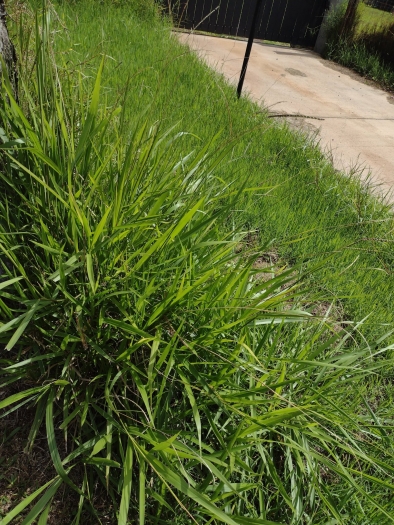Palisade Grass
(Urochloa brizantha)
Palisade Grass (Urochloa brizantha)
/
/

© Kevin Faccenda
CC BY 4.0
Image By:
© Kevin Faccenda
Recorded By:
Copyright:
CC BY 4.0
Copyright Notice:
Photo by: © Kevin Faccenda | License Type: CC BY 4.0 | License URL: http://creativecommons.org/licenses/by/4.0/ | Uploader: kevinfaccenda | Publisher: iNaturalist |















Estimated Native Range
Summary
Urochloa brizantha, commonly known as palisade grass, is a rhizomatous perennial grass originating from the savannas and open grasslands of tropical and southern Africa. It is a robust plant, reaching heights of 3 to 7 feet with a deep root system that can extend up to 7 feet, providing drought resistance and soil stabilization. The foliage consists of green leaf blades that are 16 to 39 inches long and about 1 inch wide, contributing to its dense, tufted appearance. Its inflorescence is a distinctive panicle up to 8 inches long, with several rolled, crescent-shaped branches bearing small flowers.
Palisade grass is valued for its use as a high-quality livestock forage due to its nutritional content and productivity in tropical climates. It is also utilized for erosion control and as a soil-improving species due to its extensive root system. In cultivation, it thrives in full sun and requires well-drained soils, tolerating a range of soil types. While it is drought-tolerant, it benefits from regular watering in dry periods. Gardeners should be cautious, as Urochloa brizantha can become invasive outside its native range, particularly in similar climates, and it is important to consult local regulations before planting.CC BY-SA 4.0
Palisade grass is valued for its use as a high-quality livestock forage due to its nutritional content and productivity in tropical climates. It is also utilized for erosion control and as a soil-improving species due to its extensive root system. In cultivation, it thrives in full sun and requires well-drained soils, tolerating a range of soil types. While it is drought-tolerant, it benefits from regular watering in dry periods. Gardeners should be cautious, as Urochloa brizantha can become invasive outside its native range, particularly in similar climates, and it is important to consult local regulations before planting.CC BY-SA 4.0
Plant Description
- Plant Type: Grass
- Height: 2-4 feet
- Width: 2-6 feet
- Growth Rate: Rapid
- Flower Color: N/A
- Flowering Season: Summer
- Leaf Retention: Deciduous
Growth Requirements
- Sun: Full Sun, Part Shade
- Water: Low
- Drainage: Medium, Slow
Common Uses
Erosion Control, Low Maintenance
Natural Habitat
Native to the savannas and open grasslands of tropical and southern Africa
Other Names
Common Names: Palisade Grass, Brachiaria, Braquiaria, Braquiarão, Braquiária, Braquiária-Do-Morro, Bread Grass, Signal Grass
Scientific Names: , Urochloa brizantha, Brachiaria brizantha, Brachiaria brizantha subsp. angustifolia, Brachiaria brizantha subsp. ciliata, Brachiaria brizantha var. angustifolia, Brachiaria brizantha var. ciliata, Brachiaria gangangalaensis, Brachiaria manzonzoensis, Panicum brizanthum
GBIF Accepted Name: